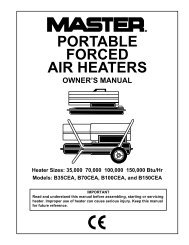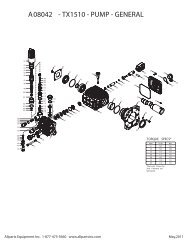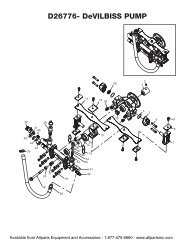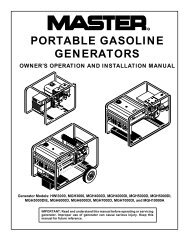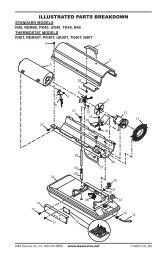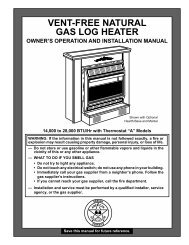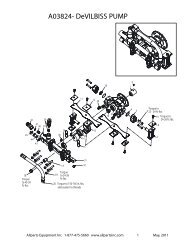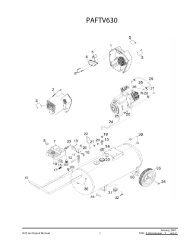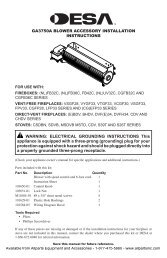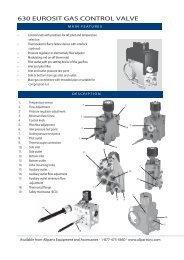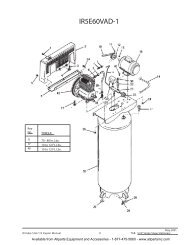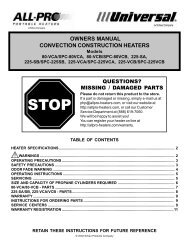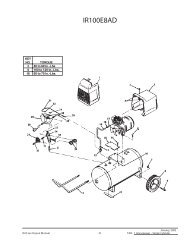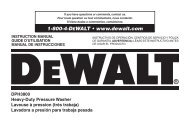Operation Manual Pressure Washer - DeVilbiss Air Power Company
Operation Manual Pressure Washer - DeVilbiss Air Power Company
Operation Manual Pressure Washer - DeVilbiss Air Power Company
You also want an ePaper? Increase the reach of your titles
YUMPU automatically turns print PDFs into web optimized ePapers that Google loves.
HAZARD<br />
RISK OF EXPLOSION OR FIRE (continued)<br />
WHAT CAN HAPPEN<br />
• Materials placed against or near the<br />
pressure washer can interfere with its proper<br />
ventilation features causing overheating and<br />
possible ignition of the materials.<br />
• Muffler exhaust heat can damage painted<br />
surfaces, melt any material sensitive to<br />
heat (such as siding, plastic, rubber, or<br />
vinyl), and damage live plants.<br />
• Improperly stored fuel could lead to<br />
accidental ignition. Fuel improperly<br />
secured could get into the hands of<br />
children or other unqualified persons.<br />
• Use of acids, toxic or corrosive chemicals,<br />
poisons, insecticides, or any kind of<br />
flammable solvent with this product could<br />
result in serious injury or death.<br />
HOW TO PREVENT IT<br />
• Never operate pressure washer in an area<br />
containing dry brush or weeds.<br />
• Always keep pressure washer a minimum of<br />
four feet away from surfaces (such as houses,<br />
automobiles, or live plants) that could be<br />
damaged from muffler exhaust heat.<br />
• Store fuel in an OSHA approved container,<br />
in a secure location away from work area.<br />
• Do not spray flammable liquids.<br />
RISK TO BREATHING<br />
HAZARD<br />
WHAT CAN HAPPEN<br />
• Breathing exhaust fumes will cause<br />
serious injury or death! Engine exhaust<br />
contains carbon monoxide, an odorless<br />
and deadly gas.<br />
• Some cleaning fluids contain substances<br />
which could cause injury to skin, eyes, or<br />
lungs.<br />
HOW TO PREVENT IT<br />
• Operate pressure washer in a well<br />
ventilated area. Avoid enclosed areas such<br />
as garages, basements, etc.<br />
• Never operate unit in a location occupied<br />
by humans or animals.<br />
• Use only cleaning fluids specifically recommended<br />
for high pressure washers. Follow<br />
manufacturers recommendations. Do not<br />
use chlorine bleach or any other corrosive<br />
compound.<br />
HAZARD<br />
RISK TO FLUID INJECTION<br />
WHAT CAN HAPPEN<br />
• Your washer operates at fluid pressures<br />
and velocities high enough to penetrate<br />
human and animal flesh, which could<br />
result in amputation or other serious injury.<br />
Leaks caused by loose fittings or worn<br />
or damaged hoses can result in injection<br />
injuries. DO NOT TREAT FLUID INJECTION<br />
AS A SIMPLE CUT! See a physician<br />
immediately!<br />
• Injuries can result if system pressure is not<br />
reduced before attempting maintenance or<br />
disassembly.<br />
HOW TO PREVENT IT<br />
• Never place hands in front of nozzle.<br />
• Direct spray away from self and others.<br />
• Make sure hose and fittings are tightened<br />
and in good condition. Never hold onto the<br />
hose or fittings during operation.<br />
• Do not allow hose to contact muffler.<br />
• Never attach or remove wand or hose<br />
fittings while system is pressurized.<br />
• To relieve system pressure, shut off<br />
engine, turn off water supply, and pull gun<br />
trigger until water stops flowing.<br />
• Use only hoses and accessories rated<br />
for pressure higher than your pressure<br />
washer's PSI.<br />
3- ENG A12496



